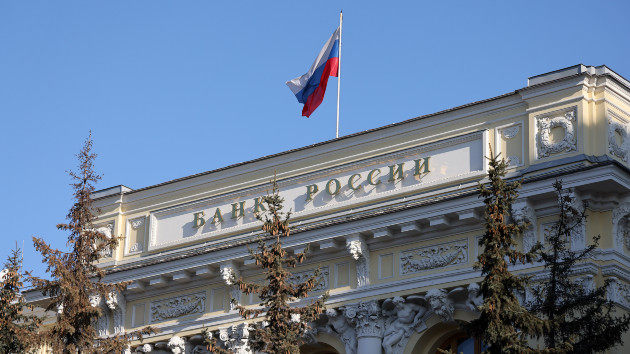
(WASHINGTON) — The Biden administration on Monday emphasized the drastic nature of economic sanctions levied again Russia over the weekend in which the U.S. and allies targeted Russia’s Central Bank, preventing the Kremlin from accessing any of its more than $600 billion in reserves in the U.S., or in U.S. dollars in foreign countries.
The sanctions also target Russia’s National Wealth Fund and the Ministry of Finance, and officials said it was clear from the beginning of the Ukraine invasion that Russian President Vladimir Putin was planning to use Central Bank assets to mitigate any sanctions.
“Today’s announcement that prohibit transactions with the Central Bank of Russia in the National Wealth Fund will significantly hinder their ability to do that, and inhibit their access to hundreds of billions of dollars in assets from our actions alone, they will not be able to access assets that are either in United States are in U.S. dollars,” officials told reporters.
“This fund and its leadership are symbols of deep seated rushing corruption and influence peddling globally … and it’s known to be intimately connected to kleptocracy at the highest levels of the Russian government,” an official added.
“Our strategy — to put it simply — is to make sure that the Russian economy goes backwards, as long as President Putin decides to go forward with his invasion of Ukraine,” a senior administration official said.
Officials explained the sanctions — a major step for the Biden administration — were announced over the weekend when it became clear it was necessary to move before the markets opened Monday.
“We learned over the course of the weekend from our allies and partners was the Russian Central Bank was attempting to move assets and there would be a great deal of assets starting on Monday morning from institutions around the world. So, we took these that we’re taking these actions in a way that they will be effective immediately,” an official said.
Officials said the “actions represent the most significant actions the U.S. Treasury has taken against an economy of this size, and assets of this size,” noting the Russian Central Bank is many times larger than Iran’s or Venezuela’s.
Officials wouldn’t specify how much of the $630 billion “rainy day fund” would be affected, but noted the U.S. knows that the Russian Central Bank has its assets diversified around the world.
“What we’ve done today is not only preventing them from using those dollars in the United States, but preventing them from being able to use those dollars in other places like Europe or Japan to defend their currency and prop up their institutions. And our – our goal was to make sure that not only would they not have access to dollars, but also not have access to other currencies,” an official said.
On the energy front, officials said they have multiple interests in keeping energy out of the sanctions packages for now: “A — because we want to support the global economic recovery, but B — because we don’t want prices to spike for the benefit of President Putin as a major energy exporter.”
Officials said over the long term, the U.S. and allies will look to degrade Russia’s capacity to be a leading energy supplier, perhaps working to keep it from developing energy technologies.
Copyright © 2022, ABC Audio. All rights reserved.
